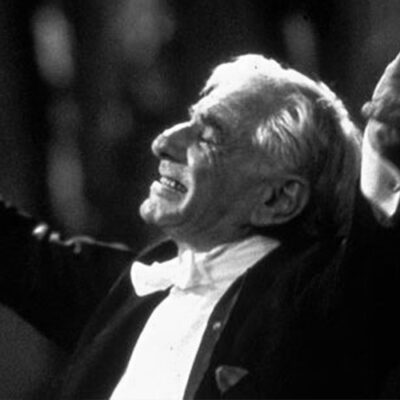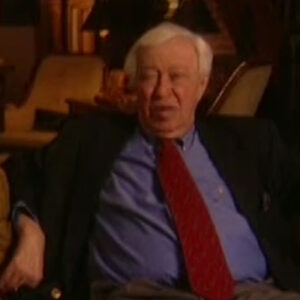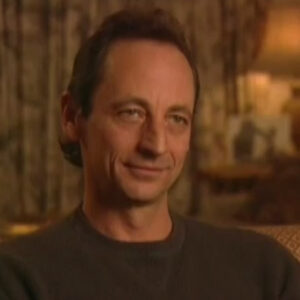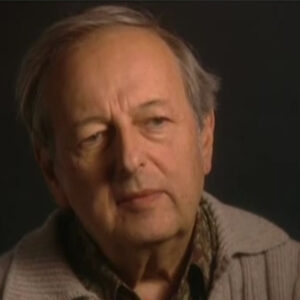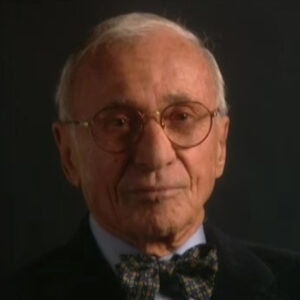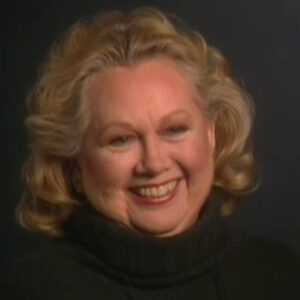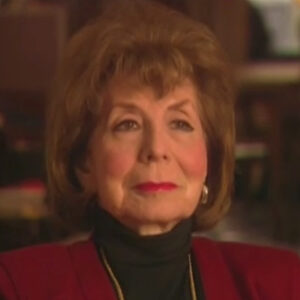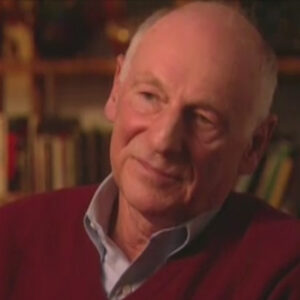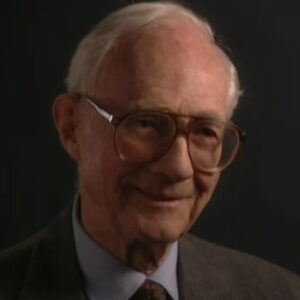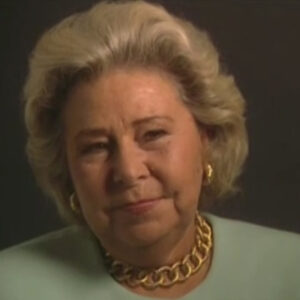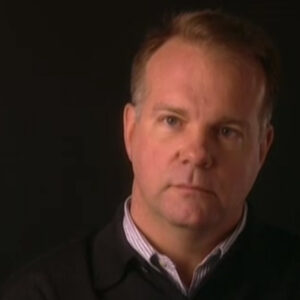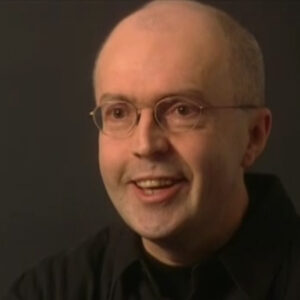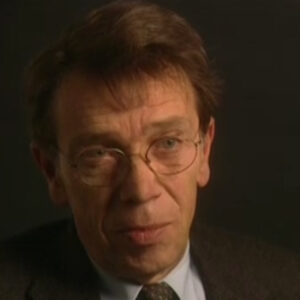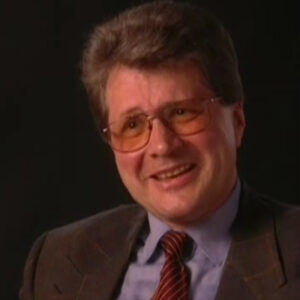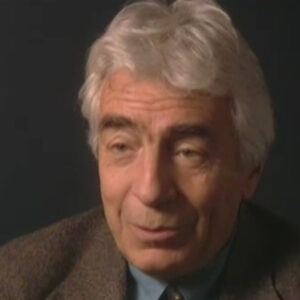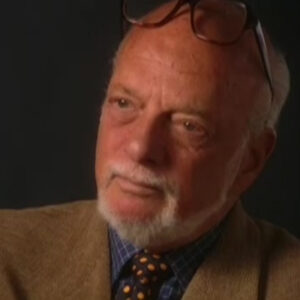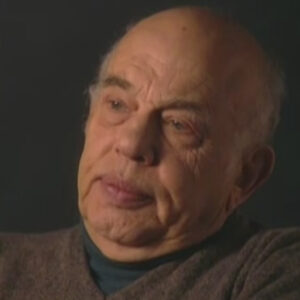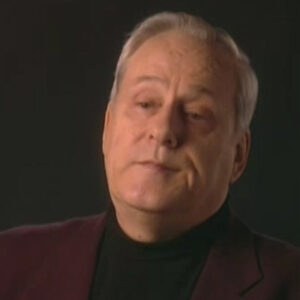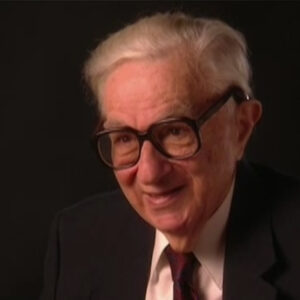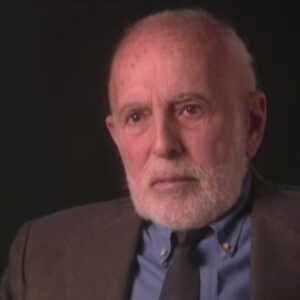Speaker Tell us about the first part of that.
Speaker Oh, yes, well, everybody in the world grew up being in love with Leonard Bernstein just from listening to his music long before West Side was an entity.
Speaker And when it was still called Gangway, Cheryl Crawford was producing it. And everyone anywhere near eligible from the William Morris Barnyard of clients were invited to a private call at her office. So we were tremendously any young person and I was one of those with a ponytail and a little pink shirt voice. And then everybody else was, you know, juvenile delinquents in leathers and robes. And we stood crowded in her her little office. And even before you got into her office and Bruce Savan was my agent from the William Morris, and he had his clipboard with a laundry list. And we were told very specifically for this audition to prepare our best audition piece. And then if we made that first hurdle to have an aria ready. So we did. And Bruce said, all right, what do you do? He didn’t believe that I was right for it. I mean, that was his opinion.
Speaker I didn’t know that at the time. And he said, What do you think, Harold? And I said, when does his feeling go away? And then if I pass it on Valby and he said, unbelted, you’ll never get through. And at which point the door opened and they said, Next. So we walked in and there was this long, narrow room, a little spin it right here at the end of the room is a huge desk, and all in black is Cheryl Crawford, obviously the judge. And then on this side of the wall was a long city. With Arthur Laurents, Jerome Robbins and Leonard Bernstein looking more cautious than any one could imagine. And so he said she’s going to sing. And I sang. When does this feeling go? A nice little ballad at the end of which Leonard Bernstein said, Thank you, Miss Lawrence. Now, will you sing an aria?
Speaker At which point my agent said an aria and he put his hands over his ears, turned and knelt down on the floor in the corner. Everybody went. In total astonishment and thank heavens, Peter Howard, my wonderful accompanist, went into Albelda, I sang. Don’t ask me how I sang it three feet from Leonard Bernstein’s nose at the end of which he stood up, took my hands and said, That was lovely, Miss Lawrence. And if you will get up from that ridiculous position, I’d like to hear her sing that in a theatre. I almost threw my arms around. And I was so grateful that he would, even if he didn’t think it was, who would just come to my rescue like that. And of course, I went on to sing it in the theatre for him. And that was the first time I ever met Leonard Bernstein. But I was dumbfounded, bowled over in love for life like like everybody else.
Speaker He was mesmerizing and charming and charismatic and more than that, sensitive to a young person’s striving and pain. So I loved him.
Speaker What I had read this other interview that we did for conversation, the first item about Bernstine. Yes, we talked about that.
Speaker They really were not looking for they were looking for a voice. No, no, no, no. You they began.
Speaker I you know, and everybody knows it. Cheryl Crawford lost her faith in the project and withdrew as producers. And for a while they just sort of went into limbo. I did another whole Broadway show called The Ziegfeld Follies with Billy. And then it emerged once again not as gangway, but is West Side Story, produced by Prince Griffith and Prince. And I was asked to come back into the theater immediately. They began giving me scenes to learn, not to learn to do, because they guarded the script very vehemently. But I then got to learn the balcony scene.
Speaker And once you heard that music, there was no doubt in anyone’s mind that we had more than riches. We had one of the most beautiful, creative, innovative entities to to broach American musical comedy. So called. And I began loving it. I did thirteen auditions for the show, which was a pretty good number. I would have done 45 more. It doesn’t matter. But the the twelfth audition, somehow I summoned the courage to ask Mr. Robbins because they said, Oh, we want you to come back. You know, you go, oh, nothing. Because by then the nerves and by then everybody knew that it was something very, very important and have to face that whole thing again was deadly.
Speaker So I said, Mr. Robbins, is it at all possible for you just to let me have whatever one scene, three pages, two pages so that I could memorize it so hard to do a love scene with papers in front of you? And I don’t know why he said yes, but he did, and as soon as Larry did and I came having rehearsed it only once. To the stage, he said, OK, I had to get his control back.
Speaker I love Jerry Robbins and he said, OK, Larry, I want you to get out of here, go back way out the stage door.
Speaker You can’t hear me and I’ll catch you later. And he turned to me and he said, I want you to get lost on the stage and want to have him sing Maria. And when he finishes, if he can find you to the balcony scene.
Speaker If he can do so, I looked at this bare stage, there wasn’t a chair, there wasn’t a there was nothing and luckily on the bare brick, old brick wall was a little iron railing that came out just a projection and a ladder that hung on the wall precariously. I scaled that and knelt down on this little and it wasn’t even a fire escape like this. And they brought Larry and he sang, they said, and then find her. And so poor Larry did all of Maria looking for I’m sorry, I’ve just my girl name and never found me. And then he began saying, Maria, Maria. And he couldn’t. I was directly behind his head, 14 feet up on this wall. And I said, oh, I broke all the rules. And he turned. And in one leap, Spider-Man lived. He somehow clung to the wall, began. I reached over and dragged him up. And we both stood on this little bitty precipice and we were more scared. But we were more in love than any two people on Earth. We clung, we loved, we kissed, we clutched.
Speaker By the end of it, he leapt and we sang our good night in total silence and he left. And then they all burst into applause. And Leonard Bernstein walked down to the edge of the stage and said that was the most mesmerizing audition I have ever seen in my life. And you got the parts. And that’s when I cried.
Speaker He said, no, no, you got the relief was so enormous.
Speaker And he was the one who told us, you know, he he just needed it all ways to comfort and to love you into enhancement and betterment. And I believe it was Lenny’s nurturing, teaching, loving, comforting behavior that saved us all from falling apart under the strain of making this come to anywhere near Jerry’s dream of perfection. And because that’s what he always strove for and would accept nothing less than you’re at least bleeding for it. And so it was when we were totally demolished and would come out of a rehearsal session with Jerry that Lenny would put his arms around us and say, come on, let’s let’s go to the balcony scene. I’ll play it for you, don’t worry. And then he would just make you feel so good. He took my face like this and he said, Oh, that was so lovely. But if it doesn’t feel good in your mouth, tell me, because I’ll change it. We you wouldn’t want to change a grace note of his genius. And we were also very, very young and untried and unknowing, unsophisticated we would have done and we did whatever was demanded was just fine, but. There was an anticipation, a longing early on that the American public would be able to have the opportunity to taste what was there for them, not only musically, because the score was more than operatic. It was it was life changing. You went with everything that happened, the violence and the tenderness and the pathos and the desperate tragedy at the end. Was all symphonic, supported by Lenny Score, but more than that, we were bringing a message of hope in what is unfortunately still an existing society dilemma, that gang wars and the violence and the bigotry and the hatred that goes on. But people came out in juvenile delinquents were brought to our show and cried for the first time, allowed their emotions to be revealed for the first time, came back and would not believe that Larry, Kurt and I weren’t living together. I mean, they really bought it. They bought it, and the American public did. And I’m deeply, deeply grateful.
Speaker I want to go back to the casting. Yeah. Arthur Laurents was saying that very sure. We cast everybody not only had to be a great singer, but had to be a great dancer.
Speaker And he said in 14 years old, that’s funny, I was not auditioned as a dancer.
Speaker Did you know that I was auditioned only as a singer, as was Larry Kert? And every time I did those 13 auditions at the end of it, I would say and and I also danced.
Speaker Mr. Robinson, you say, of course, that never, never saw me dance.
Speaker And we had to literally beg him to let us learn the ballet, the second act ballet, which is the love duet, and perhaps my favorite part of the entire show. So we but everybody else I mean, they were going to replace us as they did in Oklahoma and all of the shows so far, the two leads were going to have backups and then we would run off and they would run on and we would, you know, that that happens. But Larry, Kurt and I worked harder than anybody, and we just did those lives with such emotional excitement that Jerry couldn’t resist putting his in.
Speaker And you do you know anybody else? Is anybody else’s cast and stories from what the process was?
Speaker Oh, well, Larry was auditioned for everything from Riffe to Bernado. And at the very last, Stephen Sondheim had seen him in an industrial show sing very, very high. I remember something with a mambo.
Speaker And it was Stephen Sondheim that said, Let him read for Tony. And what a brilliant suggestion.
Speaker Thank you, Steve, because I, I think I loved Larry and he loved me in an unconditional way. That could only happen from living through those daily rehearsals of Seeking the Truth Within US, Within Each Individual was the first show where the cast, every single member was named. Nobody was a chorus. Nobody was ever treated as chorus. We all had to have a subtext and we all had to have a history and characters. And he was very much the method, Jerry Robbins and his first directorial chore. So he pulled from us truth and it worked. It really, really worked. No matter how many teeth were missing and legs broken and heads cut wide open, one young boy, Jane Norman, was hit in the prologue and a gash on his forehead. And he he could not see by the end of the scene which side to go on. You know, you had to split. And the only thing he was afraid of was that he’d crawled to the wrong side and be reprimanded. And so at the very last second, two of his buddies grabbed him and pulled him to the right side.
Speaker And then he was relieved, couldn’t care less about the pain. He was in the right place.
Speaker OK, I know this, but I’m asking a question because I try not to use a lot of narration in the film. Yeah, if you could just tell me who’s who the other cast people. Why so-and-so is a native.
Speaker Well, Chita Rivera, my sister. Because we are as because we room together and all the way through we shared the dressing room. Chita Rivera was dynamite on the stage just as she is still kicking as high as anybody in the world. And brilliant actress, singer, performer, of course, Larry Kert was Tony Michael. Callon was Riffe. Martin Charnin was a big deal. Grover There was no boy. Tony Mordente was I. He was action in the movie. I cannot remember his character in a rap. That’s who he was. And and of course David Winters was baby John Lee Becker was anybody’s Kenny Le Roy was my brother Bernardo. I never knew that Kenny was not Puerto Rican, even in rehearsal, because he never spoke without an accent. I didn’t know he was a nice Jewish boy. He was he was in character every second of the time and. Oh, just Tommy Abbot. So many incredible dancers, Alan Johnson and Gastrique Owners, who was a fabulous director. Now people have gone on. We had incredible I mean, Jerry did take 10 years from its conception to opening night to refine and he took two and a half years to cast. You could get too old for the part in the auditioning period. So he always had to see you in juxtaposition to five or six other people in order to see what the balance was on the stage. And every time he’d change something, it was as if he were taking away your baby, you know, and going to do something weird to it because you fell in love with his initial his initial effort and you didn’t believe it could be better. But it could. And he did. He did it constantly. What I love in rehearsal was watching Lenny come in. And the ballet was the one thing out of town that we kept working on because that wasn’t as well received in Washington, D.C. as everything else was. So Jerry froze the show and we just concentrated on the ballet and Lenny would bring in new music and he would play it for us. And Jerry would be standing over him and he’d clutch Lenny’s shoulders as if he were a musical instrument. And he was like, whoa, no, no, no, stop.
Speaker It was wonderful to watch the two of them in complete collaboration because they had begun with fancy free. This was just an ongoing, marvelous cohabitation of mutual desires and it just got more and more beautiful every time. It was wonderful. And to see the kind of dedication, the kind of not before and certainly never since have I seen people that much into a piece. He Jerry described it as a battle ground. The theater, the stage and the right side of the stage belonged to the sharks and the left for the Jets. And you didn’t cross that was dangerous territory and you never, never spoke to anybody on the opposite gang. It was not not allowed. And he would Jerry would incite. Little feuds and little asides that probably weren’t true, but that would get two guys just going at each other in the rumble and you never knew why, but he kept us alive. And it was it was absolutely thrilling. Every every second of rehearsal was dangerous, dangerous in every in physical and in mental and emotional. He controlled the entire thing as if he were some kind of.
Speaker God, way up here, you know, and strings were attached to you, this separation between the jets and the sharks. Mm hmm.
Speaker Didn’t occur just on stage all the launches. Yes.
Speaker That I love it. Well, I can tell you that one afternoon Jerry took the Jets out for lunch. He came back with fedoras. They all had matching fedoras and rope belts. I don’t know how they pitched in, but when they came back from lunch, they they were together and we were all a guest on the shock side. So I went home. Now, I wasn’t a fighting member. I was sort of the elite outside of the group. And I sold little sharks. I made an outline of felt and put pins on the back and little button for the eye. Those were the guys and I wired Rose’s little false roses that went straight up like this that you could pin so that out of your head was going to come. This wonderful rose and I and I went before the we always at a bar before the glass to warm up.
Speaker And so I went to the boys dressing room and I said, are these out? And you just don’t say anything. And then what do at the bar you’re going to be just going to be sure.
Speaker So everything I couldn’t wait. Couldn’t be. So the girls are pinning the men in secret and somebody comes and says, Renata wants to talk to you because I made his bigger than anybody’s right. And I came out, he said, did you get a shark? And he said, I want to tell you one thing.
Speaker I am the boss. I am the leader of the gang. You are not. And nobody gets to tell anybody what to do about me.
Speaker And he threw the shark in my face. Says, you take those roses out of their hair and don’t you ever do that again. I said, yes, sir, three bags full, so depressed, but we took them all back, and that’s the way it was. He wasn’t about to let a woman dictate any. Now, who would ever guess that he would react like that? He was my brother. I mean, I loved him, but he wasn’t about to do it.
Speaker So what? Stanislavski method was working very well.
Speaker It really worked. Yeah, it was. You just never we had almost fatal accidents. I mean, George Marsh, he broke his femur, broke it. Compound fracture on the stage, in the rumble, in the rumble. And we had an attending doctor out of town in Washington, D.C. And one Wednesday matinee, I came from lunch. We’d been rehearsing in the morning. And there he was sitting and I said, oh, Dr. So-and-so, is somebody hurt?
Speaker And he said, no. But if you think you’re going to drag me off the golf course again on a Wednesday afternoon, you’re crazy. And sure enough, somebody got hurt.
Speaker Wouldn’t you know we always had something happening with the action in the rehearsal.
Speaker So it was absolutely real. And those 16 counts of music within each phrase before you had to be on the other side of the stage were free four and you better keep it fresh and you better heard him because he’s going to hurt you.
Speaker It was defense. It was self-defense.
Speaker Yes, and encouraged, yeah, for anybody who kind of got left out of cold at lunchtime.
Speaker Oh, she was never allowed to really belong anywhere.
Speaker Literally she was and anybody’s but nobody’s Woodwards and really was such a brilliant choreographer and dancer and and lovely person, which took it all personally, I think. I really do.
Speaker But went on to make the American dance machine. You know, so many people are just continually Grover Dale is still choreographing. Tony Mordente is directing. Astrachan is everybody is still cooking. I’m very proud to have been a small part of the company.
Speaker Did you all know while you were doing this that you thought you were doing something to make history?
Speaker Yes. Yeah, I think that there was that knowledge walking in. You could not have heard the score. You could not have read that script. I mean, I was demolished to a T. is the first time I got to see the script complete. And everybody coming into rehearsal every day knew that they were working on something that if those seven critics said yes or even if they said, OK, that the American what? Because out of town opening night in Washington, D.C., they were stunned. The curtain fell after the death scene and the bells tolling and the taking of his body. And there’s a place for this all you hear.
Speaker And then we ran to the curtain and the curtain went up and we looked at the audience. They look at us and we look back and I thought, oh, dear God, they didn’t get it.
Speaker It is an artistic flop and I was ready to call it a day. And then as if it were choreographed, they left their feet screaming and pounding their feet and applauding and crying. And you knew you knew that we had touched a nerve. And it’s still touching nerves all over the world. It’s a renowned classic. But, yes, we knew it was there. There was no no doubt those people would say, oh, we are out of town, had no idea or we never really dreamed it was a flop. You always know it’s a flop.
Speaker You go you know, you try your best to make it work.
Speaker But we knew we had a winner. Oh, did we ever.
Speaker Yeah. Do you think that the creative collaborators knew it, too?
Speaker I think they knew it once we were opened.
Speaker I remember Arthur Laurents telling me that Oscar Hammerstein on opening night of Washington, D.C., and had had said to Jerry Robbins, who was the head of the aisle, Jerry, you have created something that has never existed before.
Speaker And I’m so proud and so happy for you and I congratulate you. He said one funny thing he said, perhaps your most spontaneous, delicious moment was, I feel pretty. I’ve never seen such spontaneity and such joy at being in love. And it was because we had never done the number that we ran out of space and we had run out of time. So pretty never got restage. We we lost six feet in the winter in the national theater that we had at the Winter Garden. And so when I went to Jerry at dinnertime, we were already broke and I said, oh, we didn’t restage pretty and there’s no place to dance.
Speaker He said, oh, I’d livid because he really didn’t like the number so it could go. So at dinnertime, I just stayed stuck around and got a rose in a mirror and a pillow and I didn’t know where to end the number. So I turned around like a four year old and flopped on my behind and it stopped the show.
Speaker And that’s the one that Oscar Hammerstein loved the best. So the number got saved because of Oscar.
Speaker That’s the only reason and because we just ad libbed it.
Speaker It was it was just a miracle, a wonderful miracle, because Oscar was really.
Speaker Exactly. Exactly. Oh, yes.
Speaker It’s funny because it’s the song closest to Oscar Hammerstein.
Speaker It is. I’m in love. I’m in love. I feel pretty good. It is. It’s something that Oscar would identify with. You’re absolutely right. You’re absolutely right.
Speaker Gosh, I got carried away. I remember. Well, I’ll tell you this, OK?
Speaker Yeah. So tell me more about the collaboration, watching the collaborative, watching this come together. What kinds of things were changed, what backstage stuff about the actual creation of this musical?
Speaker Everything was under the agreed control of Jerry Robbins. And I think that is the greatest way for any musical or any entity, really.
Speaker There has to be somebody where the buck stops and the decisions are ultimately his to win or to lose. And he will go with that. Jerry made the final decision and therefore there was never any side of bickering or disagreement which made everybody feel tremendously strong. It’s when and I’ve been in those shows where everybody’s screaming at each other and and nobody knows quite what to do. And the company is torn apart trying to please the person who to whom they’re speaking. There was never any of that. We always knew exactly where we stood and there was no questioning. First of all, Jerome Robbins is an absolute genius in whatever you created. Always worked. So there was not where. Oh, that that’s really Jerry and Lenny, no matter what he loved best. I know there was one time at the orchestra reading that Jerry just walked out on stage and cut a whole section. I said, I don’t I don’t like the way that I went.
Speaker And you knew that Lenny was dying and he just got up, didn’t say a word, went out of the theater, went directly to a bar and ordered a double whatever.
Speaker And he was brilliant at not squelching or never allowing the emotions of all those creative. And they were all tremendously talented. And it was a marriage of every link being so tremendously strong that there wasn’t a weak one among them. And because they were orchestrated and.
Speaker Finalized by Jerry Robbins, it was perfect, as perfect as we could get it.
Speaker Well, every bit of rehearsal was a testing pattern when at the audition, when he said hide and if if he can find you do it to the balcony scene, that was the way you began everything. It it was a challenge. And he was always asking you to dig deeper for a more important personal thing that you could stand and and really live as. Maria He never, never called me anything. But Maria never called anybody but by the character name. And so you do a scene with the words you do the scene with no words with with just pantomime. You do it with lyrics, without music. And everybody had to have a history, a really violent one that made you action, why you hated your mother, what she did, whether she abandoned you or whether she was a hooker or whether she was a dope fiend or whether you were you had to have that act at your fingertips at all times because he would question you.
Speaker That was Jerry’s method of keeping you always at the ready. Always.
Speaker And I remember one once we were doing the ballet, which we he would have us going through a grinding machine. Literally, the kids would do this and we would have to come through it. Will you get, you know, bombs and bang to Bruce and then at the end of which they would pick us up and then throw us at the very end, Tony and Maria were cast at each other. And then in the blackout, we were caught and rolled down, say, well, one day and nobody questioned. You did what you said.
Speaker And they said, oh, you said, OK, the Maria pictures, get her up.
Speaker Never called them Maria Catorce, OK, five, six, seven thruout.
Speaker And they threw me, they threw me like this. And I mean it’s Balat flat out on the stage and it was total silence.
Speaker And I was hurting and I lifted my head and I turned like this and there were my three understudies.
Speaker Is she dead? Maybe she’s gone. I turned straight out where Jerry was and I said, I’m OK. Jerry said, well, then get up and do it with the catcher’s.
Speaker It was my fault.
Speaker And so the cat just got up and we did it again, but the guys caught me, put me down. I rolled forward and then they all came and helped me up and walked me off just looking at you. That’s as close as a defiance as I ever saw.
Speaker Or and it’s because I was.
Speaker No, I wasn’t bloody, but I was badly bruised and they had thrown me because.
Speaker That’s what she did, was this blackout, the blackout that we thought it was the ballet. You’ve never seen the second act ballet where they pitch Tony and Maria at each other. It’s the culmination of the fires, keeps coming back in the utopia going back. And we are brought back into reality in the bedroom scene. And so we are literally pitched in full light. We are reaching towards each other. And then just as we would touch, the blackout happens and we are caught in the dark and then rolled back into the bedroom scene and everything’s rolling on. You know, that was the first time that Seth rolled on. And you never went into one. Never you never saw a stagehand. You never were aware of anything except that all of that. I mean, Oliver Smith won the Tony because the sets were dynamic, the lights. Rosenthal I mean, everything about the show was top, top notch. Yeah.
Speaker The other things about the show that were really revolutionary.
Speaker Well, scenically, that was absolutely magnificent that you would have so many young people singing the quintet, you know, right before the rumble. When did you ever hear a musical comedy with with five different six different melodies going at one time and knowing what each one was? Lenny was so brilliant at scoring that and he conducted that one and we sounded like angels.
Speaker I mean, you can’t look into that face without something magnificent happening.
Speaker He was he was just dynamic.
Speaker He was so thrilling. Was really billed as a musical comedy. Yes, it was. But we changed that. The name for musical comedy to musical theater. That was the very first time they couldn’t call it a comedy. We killed the three main characters and it was Romeo and Juliet. And people sat at the end of the show and were too stunned to move some of them and came back. Some people saw it 37 times. He’d look in that city, Mary, and there would be that same face singing along with you. And little kids took it to their hearts. It was a score that was played and five and six year olds would say, but I want to go and see it.
Speaker So for their birthday, they would come to a matinee and you’d look at because you could see the first four or five rows and you’d see head, head, head, no head. But then out of that with no head was they’d be singing with you. I feel pretty high up here. It’s birthday time and they would love it. So it was it was a score that touched the young. And that’s what everybody was so afraid of. That was too esoteric and too difficult and too atonal. And five, four, three, two, five, six, all those wonderful meters that he changed every four bars. It was great. It was great. You got one hundred and forty seven point forty nine in the ballet.
Speaker It was miraculous. Thrilling time. Thrilling, yeah.
Speaker How did your rehearsal. Many, many times, Lenny. Because there were so many elements. I mean, the dancers began a month before we rehearsed with Gerald Friedman in an attic somewhere for a month. The principals, just the the book scenes, while the dances were and then the dancers would be working on one thing, Lenny would take us off into another room and just work on the balcony scene or the wedding scene, just the musicality of it. Or we would be up in the balcony on another platform working with Jerry.
Speaker The show had so many complex elements that he rehearsed as Jerry Robbins was a mastermind at keeping everybody working the full, full eight hours, ten hours, sixty, whatever it took, whatever it took. But Lenny was always available. You had any questions? You had a and the mentor in him, the teacher, you know, he was so many men. And besides being the most miraculous genius, the most creative, always able to find another way to ask you to think of it musically, that would sound completely different. And then he would applaud. He would encourage that when it was right and in the gentlest way, get you to do it differently.
Speaker If it weren’t. But never did he denigrate you? Did he put it down? He was. And always. Always. Capable of coming up with a new melody and a new scherzo and a new whatever Cherry needed, he provided the next morning, I don’t know where it came from. I mean, I’ve never heard such beautiful music in my life. So many things we’ll never hear because they got lost along the way. You know, they just didn’t measure up or they didn’t fit that by moment, which we could have kept him.
Speaker How did Lenny direct you in rehearsal with kid gloves? Well, and if you wrong direction in that, he may have been a very operatic because it it is. Yeah. It doesn’t come across. It comes across as totally appropriate. Exactly. He never, ever sought for us to have.
Speaker There was never the desire for a sophisticated sound, for a polished it was always his seeking the line of emotion.
Speaker What were you saying first of all, and what did you want then he would lay the music on it. So you never felt that you had to try to be anything but a teenager? We were not playing opera singing. We were playing row kids out of the streets and thugs. And I was guttural at times and and yet it had a beauty. He was capable of taking it without making it a an over sophisticated formalised.
Speaker It was honest and real and full of the meaning of the piece. And that was the important part. We were never told to sing more, we were told. To reach you, to reach the audience, to touch them, to make them cry, to make them laugh, to make them feel what they were supposed to be sensing with you at the same time.
Speaker Or do you think of just curious thing about what did you think of that Leidy’s recording of the opera singers?
Speaker Well, it was so against everything that we ever tried for. And I guess the music screams to be sung at its peak. You know, it’s pear shaped tones. It wasn’t West Side Story for me.
Speaker It was an operatic interpretation of I mean, careerists should never have been Spanish. Tony is not a asharq. So everything was off for me. But that’s because I lived it originally with the people I absolutely loved in the parts. And that could never be replaced. Never. Yeah, well, you know, let’s go back to Washington.
Speaker The opening.
Speaker Are there other.
Speaker Well, the closing when you’re speaking on the air, when we began the show, nobody knew what to expect and it begins so, you know, with just the snapping of fingers and the thugs on the streets dancing and ballet.
Speaker It was a great deal to ask the audience to accept and to come along for the ride. And for the first part, they were very apprehensive and they sat back and then suddenly America happened and they laughed and they screamed and it stopped the show.
Speaker And we knew that we had them. We knew that we had them. And from then on, they they went with us. And at the very end, I mean, you could hear a pin drop. It was it was devastating. And the gasps and the oh, it was very gratifying to know that the that they the people could change their minds and that they could allow you to touch them. That was thrilling. I know Lenny was opening night. We had eighty seven thousand and Broadway and by that time he had come back and I was crying so and he walked out directly to me and threw his arms around and we both just sobbed because it was New York that we were aiming for. I mean, Washington and Philly all. You’d come out of the Erlanger Theater in Philadelphia and people would be waiting and still crying and they say your job was great, but you’re not going to kill Tony at the end. You’re going to let him live. Right? You’re going to change that.
Speaker You know, I don’t know what you’ve got to change now.
Speaker I know I don’t care about it, but they were they were really into it and wanted you to rewrite it, came back and waited for you to come out like I would have anything to say. But they couldn’t bear that that Tony died. I still can’t stand it.
Speaker So, yeah, I was you for opening up New York City on opening night.
Speaker We.
Speaker We’re finished and everybody everybody’s family came backstage, of course, and cried and laughed, but you all got dressed up. It was the tradition at the time to go to Sardi’s. That was what you waited for, to add in brand new black dress. And we went to Sardi’s and they had all kinds of food and wine and.
Speaker And you waited and you waited because the reviews were coming up. But it wouldn’t be till three thirty four o’clock in the morning.
Speaker And the first one came and it was unanimous that Lenny should read them because first of all, he was so gorgeous in the voice and the dramatic flair that he had for as I stood on a chair and he took the stage and he read this magnificent review and then one after another came out and they loved the show, the only person that Walter Kerr felt that it wasn’t a proper subject to be dealt with, but it was dealt with brilliantly.
Speaker And so that was OK. And we accepted that from Walter and dear Lenny stayed up all night, read every single review, and then went the next morning and flew to Israel to conduct the Philharmonic. So he was he never stopped. He had too many genius angels living inside of him to deprive us of any of them.
Speaker I just wish that he had taken a little better care of himself because he’d still be here loving us and contributing to the world’s joy. That’s all turning and turning 80. I want him to be one hundred and eighty. That’s what I would have loved to see me having a great time.
Speaker Well, my favorite picture of Lenny is the morning after we opened and the reviews came out in Washington, D.C., and he went to the box office to see how it was going and we were already sold out.
Speaker Somehow he came out of the lobby of the National Theater, was in his white suit, and he did a script like this. And that’s my favorite picture. I have it at home and that’s the way I see him. I know he’s doing that somewhere. He’s sold out wherever he’s playing. I know that. Yes.
Speaker I’m curious about something. I have I hate to admit this.
Speaker I have never seen a theater version.
Speaker Oh, my goodness. Every note. Yes, I know you do. I really do every year.
Speaker But I’ve always seen the film. Oh, then you’ve never seen the ballet. That’s great.
Speaker Oh, that’s one of, I guess, the saddest things. I’m sure that there are the ballets that that Jerry has done, the sweet the West Side Story Suite, which is fabulous, but.
Speaker My greatest regret is that we never did an archival film of the original company, there were dynamics and things that happened between Cheetah and that taunting scene that can never be duplicated, things in a boy like that. That was my favorite scene.
Speaker Lenny’s favorite number was I have a Love and it’s all I had.
Speaker I can’t even do it now. But the ballet was never filmed and we had superlative dancers, but more than superlative dancers. They were each one in their character.
Speaker They were actors screaming, screaming, their violent screaming, their joy, their hopes of utopia, the love ballet with lifts that are so dangerous that when they tried to recreate Jerome Robbins Broadway, some of the dancers refused to do them.
Speaker We said, Sure, Jerry, tomorrow, you know, as many times as you want, my head would skim the ground this close to, you know, total concussion or death. And we did it every eight times a week. And it’s it’s just a tremendous loss that those personalities can never be tested and saved. You know, looking at Isadora Duncan today, the crazy films, but they are, in essence, that are nobody else but Isadora Duncan. So it breaks my heart. I just think that Jerry would not allow it, and that’s his prerogative. You know, at that time, it was not allowed.
Speaker There was the erroneous idea that if the audience saw it on film that they would not buy tickets. And for a full year, we were not allowed to do anything from the show. I did many, many Ed Sullivan shows, and of course, they wanted me to do I feel pretty the first time and I wasn’t allowed until we were open for free a full year.
Speaker And then Larry Kert and I did the balcony scene and the next day you couldn’t get near the box office because everybody wanted to see the rest of the story. And so it was the way people thought that said, it’s just amazing to me.
Speaker That close, I know, without ever just getting an archival, they do that for every show now and it’s it’s gone.
Speaker Were there other elements of the Broadway show that were lost in the movie version?
Speaker Oh, I’m sure there were a little note. I feel pretty was not staged the same way. We had much more dancing and much more fun. I mean, there were just the way people that, you know, the rumble was very different. There it’s the difference between live theater and the perfection and the the unreality of film. For me, I just love the fact that, you know, I could fall down flat on my face and if I did, I’d have to get up and recover somehow. That’s the thrill of live theater. For me, it’s the danger. The danger.
Speaker Were there any changes in the score with your songs? Dropsondes added.
Speaker No. Once we got rolling from the balcony, scene was was changed very, very little. And something’s coming was added like two days before we opened in Washington, D.C. But from then on, all our show was truly frozen except for the ballet, and that underwent a myriad of changes. But they were internal. The theme of it, the utopia that was given to everybody to to enjoy in the Scherzo circle that I loved so much. I do have one one film, one little picture of that leaping from the wings.
Speaker Those in internal melodies would be change that only the original cast would be able to remember, but ostensibly, of course, it into the same way.
Speaker Yeah. Have you been in any revivals?
Speaker No, I did the show and left to do Saratoga and it went on the road for a year and a half and was going to come back to the Winter Garden. As for six weeks, you know, with as many of the original company as possible, because the Winter Garden was going to be empty. We came back. They asked me to come back for six weeks. I said, oh, sure, Larry was still in it. And I we came back and were a bigger hit than we were initially and literally went from one empty theater to another. We went from the Winter Garden to the Broadway to the oh golly, I can’t remember all the houses, the Alvin we played, whatever it went on for another almost year. So yes, I was in a kind of revival of it was on Broadway as well. I’ve only played it on Broadway.
Speaker And Philadelphia, Washington and Boston, that’s what he would say, I think, again, it was Arthur Laurents at.
Speaker If that show were today, it would probably run for seven years. Yes, what’s the difference? Curious about what what was the difference between Broadway that day?
Speaker Boy, I don’t know. But a two year run was a great run. I mean, you sort of maybe because so many more shows were available, then people wanted to see the variety of them that they would then let a show that’s been there for two years go by the wayside and it would dwindle down to where the shubert’s felt it wasn’t earning its keep in the theater and they needed the theater for a new show. We don’t have that many new shows coming in now. So when a great show like Lamees or Miss Saigon and Phantom come in, they stay because they pull on the tourists and they pull on the people who want to see it again and again and bring their kids to see it and bring their grandchildren.
Speaker And it becomes a landmark almost on Broadway. I love that idea. I love that good theater. Be able to be seen for more than two seasons. That was a great run. Two seasons.
Speaker Have you heard any talk about a revival of research?
Speaker I believe there’s one out there right now that I think not grooming, but grooming to come in. I don’t know. I’d heard that Alan Johnson was involved with that. He’s the man that Jerry has given the rights to produce his original choreography. And that’s the way it should be seen. I don’t believe anybody should have a right to do it.
Speaker I don’t think anybody could touch Jerry Robinson’s interpretation and choreography. It was genius. What’s wonderful is wonderful.
Speaker Are there any other backstage stories that you can remember? Oh, wow.
Speaker We had, you know, at the very beginning of. People got so into their characters and and we were such the toasts that we were so young and took everything so seriously, the kiss, the kids, the boys upstairs would really do terrible pranks.
Speaker They’d grab a girl and just threaten to do all kinds of things to scare. Right. I don’t think they would ever have done anything, but they ran away with themselves and we would have gangs come in and literally challenge them to a rumble. Real street gangs. And they say we’re just dancers.
Speaker Suddenly the truth won out because they were going to face guns and knives and all those good things for real.
Speaker Can you tell the story about the end, the very last number that was originally going to be in your area and how that changed?
Speaker How do you see I don’t even know this. You can probably tell me more. We did. I never learned an aria that was for the last scene.
Speaker I know that in the first time that we did it with a gun instead of a pencil, you know, that literally Action Grovels, Eddie Rawles was action and he was really me. And I took that gun right into his face and he turned to color. I have never seen. And tears welled up into his eyes. And I broke I just fell down to my knees and then the police came in and and Jerry froze it, he just said that’s the way it was to be in. There wasn’t going to be any song. That it was high enough pitched and that he felt it was it would have been uncalled for, unreal and superfluous, and so I never learned an aria, so it was never written. There you go. It had been anticipated and that’s what they thought would work. But in truth, it just went, you know, like a freight train and you couldn’t stop it. And it it had already peaked dramatically, I think, with what happened just chemically with this young boy and me and and then just racing to his body and begging them to come over and take it.
Speaker I don’t think it needed to be something that was the right decision.
Speaker Good, I’m glad you’re here.
Speaker Did you do a run through?
Speaker I think I’m recall for an invited audience, everybody from Lena Horne to Gwen Verden to I mean, everybody I’ve ever loved and admired. And we just did it in leotards and tights. The ladder with the balcony. The piano bench was my bed. The pencil was the gun. Everything, I mean, as dark. And yet I’m told by the people who saw it because the reaction was enormous, that it was probably the most even after they came to see the show, that there was something absolutely dynamic and charged electrifying because it was the first time we ever got any kind of reaction. We had no idea where the laughs were or where the gasps were or where that total silence and it was.
Speaker Yeah, I remember it so distinctly. Yeah. The Broadway theater. Are there photographs?
Speaker Probably not. Jerry never allowed cameras. We had one day, the first day that the whole company joined together. That was the pictures that you see with Lenny at the piano and Steve and Chheda and everybody around.
Speaker And we were all gussied up and Jerry said that the end of that no more posing, no more posturing, none. So, no, never.
Speaker I have no no cameras.
Speaker There must be photographs, there must be photographs of actual production went up.
Speaker Oh, surely. Oh, absolutely.
Speaker Freedom enables them all. Yeah, they were beautiful there.
Speaker I guess the thing that really made West Side Story so very important was that as total unknowns, we were dancing Gerry’s hardest steps. We were singing Lennie’s highest notes, and we were acting Shakespeare’s most anguished theme all at once. And every night and consistently, you see, Jerry kept such tight reins on the show, you never knew when he was going to be out front and cheering. And I one night broke up in I have a love in. At the end of it, she started stuttering. She supposed to say she has a condescending voice and she said she has a gun. He sent it. He said he said he said, well, you know, you want to go like that, but you don’t do that.
Speaker At any rate, I fell in her lap and we were already crying, but now I was laughing.
Speaker So you would do what Tony did. I know. And it was it was we were gone.
Speaker So thank God the police came in and rescued us. That night was cheater’s wedding shower. So everybody did their imitation of. Yes. And boys. And and so we laughed until dawn. Now, the next night we came to the dressing room and Cheeta was in her dressing room and she said right next door. And she said, Do you want to run the scenes? I said, No, I don’t want to hear it again. Let’s just do it. Let’s please cheetah. And so she said, OK, I promise I will not stutter. I promise. So we get now we are demolished. We’ve demolished the scene, the SEC, and she picks up my children and she says she no has that.
Speaker I saw her tonsils. I saw her. I know. I was really got. We could not stop laughing.
Speaker Well, the third night, everybody’s in the wings. We go again the fourth night. Now, we first of all, it’s our favorite moment in the show. We don’t want to go up. And Ruth Mitchell, who is the stage manager, tough lady, came up and we said, Ruth, please don’t start because we don’t want to break up.
Speaker We play. No, no, no. I know how that happens. You know, don’t worry about I have to tell you that the bedroom scene is having a problem. The set is might not come on. So if the door doesn’t make it cheaper, you just come in from the other side, not, you know, with your foot in. Come in.
Speaker Oh, sure, we can do that. And she says, oh, it’s half hour and Jerry’s here tonight.
Speaker We got to see Chino has a gun. He’s sending the boy there.
Speaker Nobody broke up because he would have leapt right over the first footlights and killed us then. And you did not break up in West Side.
Speaker You did not tell them about the other night?
Speaker No, he wasn’t there. But that was the way Ruth knew we would stop, because when Jerry came in and he gave us notes periodically every every month, we would come after the show and said, one night I got and this was out of town. Do you know Peter Gennaro, my dear, sweet Peter talks like this. And Peter was he did I feel pretty? He did the America. He did all the Spanish things and the sweetest man in the world.
Speaker And so one night we were getting notes and I got more notes than anybody in the whole thing. He came back to my dressing room and he said, Could I ask you how many notes you got? I said, I don’t know. So we got to them.
Speaker And he said, 64 hit the five notes.
Speaker He said, I can’t believe you got sixty five notes. I just came from Larry.
Speaker Larry’s in there crying because he got sixteen and rivers over there crying because he got twelve. You got sixty five. All you did was just keep writing, just keep. And that was the way you did. I couldn’t care if he was going to give me seventy five.
Speaker I loved getting the attention from Jerry Robbins because it was gold and whatever he had to say I would listen to today and tomorrow and forever.
Speaker Can you describe Sondhi to grow older or.
Speaker Steve was very, very young, and this was his first Broadway collaboration, I believe now he may have done something before, but I didn’t know. And he was he began writing lyrics because Lenny had been told that so many more ballets were being added and so many underscoring problems. And and he didn’t feel that he could cut himself in that many pieces. So he asked for a couple lyricist and some of the lyrics had already been written when Steve joined.
Speaker So I was never in on their collaboration. I know that he doesn’t like I feel pretty to this day. He feels that it was wrong that someone as naive and uneducated as Maria would have in her rhymes in her song. But it sure does work. And I loved and I loved everything he did then and has done since. And he’s a brilliant genius so that when work in the theater after with a story I love Candy and I never saw 90s. What is it, the Pennsylvania Avenue, the Washington, D.C. thing. But I, I just think that his music in Candide was absolutely brilliant and it’s been proven to be most successful. So and a quiet room and all of the things that he wrote since in the Mass I I’m a giant Leonard Bernstein fan and he can do no wrong me. I love listening to his music.
Speaker So what’s the story about the club getting the rights to do this?
Speaker Whatever this show, Larry, Kurt and I were going to do Rainbow and Stars. And of course, the opening number is of greatest importance.
Speaker And Larry had no qualms about asking Stephen Sondheim to write this in the act and taught me to to it. I mean, his friends were top notch and they were all busy doing their own Broadway shows. So he was with Tommy Tune. And Tommy said, I’d love to contribute. I’m busy doing I’ve forgotten which of the Broadway shows he was in production for. So we’ll pick my brain right now. And he said, well, how would you open it, Tommy?
Speaker And that’s the biggest question. He said, I know you’re going to do a West Side medley, but don’t make us wait an hour to hear it. Give us a taste at the front of the show. And I thought that was absolutely on the nose. So I kept seeking ways to do it. And the way that seemed the best was to begin in the dance hall.
Speaker Where you hear bup bup, bup, bup, bup, bup, bup, bup, bup, my bow, yeah, but the part that I put up and just to come on, you know, Larry, on one side of the room and me on the other saying, hey, I didn’t know you were coming tonight, you know, with the coverage and just keep talking until we get to the stage and the charge, just the way we matter.
Speaker Initially we would walk to the center. Dum, bum, bum, bum, bum, bum, bum, bum, bum, you know, so I wanted because a trio could not play it in the room is too small for anything that just to use a minute and 10 seconds of the original album. And so we knew that we were into ground rights immediately, but I had to call Leonie’s lawyer and I said we would like to begin with just the track, no lyrics, no nothing. We wouldn’t have to have Steven’s approval. We want to do that. And she laughed and she said, Well, Miss Lawrence, you’re into ground rights. There’s no possible way that you would give that one. And I said, oh, I ask you one favor. Just ask Lenny if he would let us have the rights to it a minute and 10 seconds and. So she said, I don’t know that I could get out of it. Long story short, the next morning, very early, she called. She said, Hello, Miss Lawrence. The maestro said, you can use anything you want as long as you let him see you do it. And I was just floored.
Speaker Well, we open that way and it killed everybody.
Speaker I mean, you could hear people go in the audience because they were reliving the first time they saw West Side Story of first time we were together in New York City since then. And I got a call. We got reviewed. It was wonderful. And the secretary said, Lenny wants to come on your closing Saturday night and there will be 16 of us. I said. Twenty thousand, I couldn’t care less so that night we were anticipating seeing him, just holding him in our arms and the secretary came with flowers to my dressing room and said, the maestro is just too early, sends his apologies. He can’t make it. And the saddest part is that he died the very next day.
Speaker Yes. And that was a Sunday and the Monday after I went on Good Morning America and got to tell the world what a generous, loving, ever remembering, faithful teacher and creator he was. He was a friend beyond friends. He never expected anything from that except to help us do what we wanted to do. And if he could be a part of it, he was always there for us and I love him for that.
Speaker Thank you very much. You’re welcome. Wow.
Speaker No, I thought it was just such a privilege. Such a miracle in time to be given the joy of being in his presence and doing his what I consider one of his finest works for the world to enjoy. That’s that’s the miracle. And I thank him for it.

